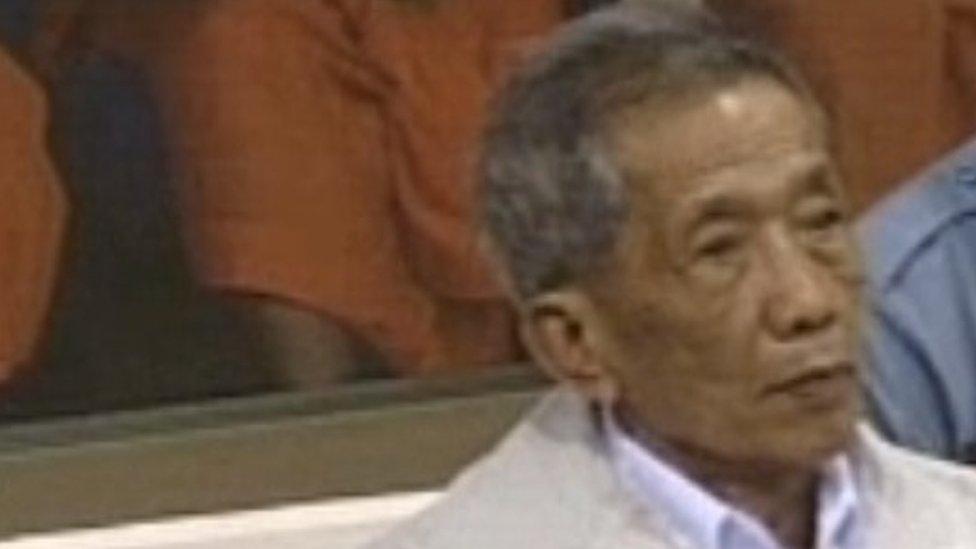Cambodia genocide: Khmer Rouge prison chief Comrade Duch dies
- Published
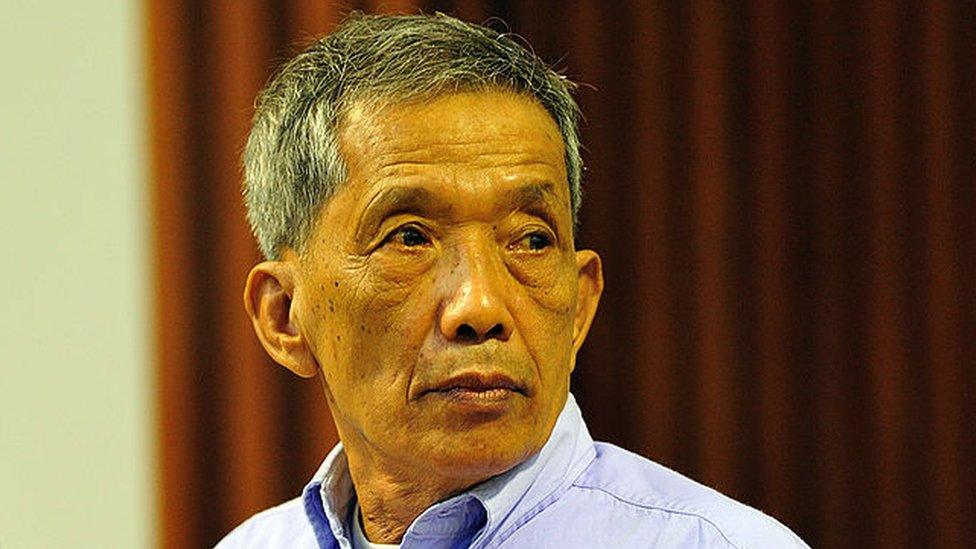
Comrade Duch claimed he was only following orders
Comrade Duch, a former senior figure of the Khmer Rouge convicted of crimes against humanity in Cambodia, has died.
He was serving a life term after being sentenced by a UN-backed court.
Kaing Guek Eav, known as Comrade Duch, ran the notorious Tuol Sleng prison where thousands of people were tortured and murdered in the late 1970s.
As many as two million people are believed to have died under the Khmer Rouge, a Maoist regime that controlled Cambodia from 1975 to 1979.
In 2010, Duch became the first senior Khmer Rouge leader to be convicted by the UN-backed tribunal after a journalist found him in hiding a decade earlier. He was sentenced in 2012.
He died on Wednesday, aged 77, a spokesman for the tribunal in the capital Phnom Penh said, without giving details of the cause. He had been ill for many years.
"Duch died this morning at 00:52am, on 2 September at Khmer Soviet Friendship Hospital. Details of what he died of, I can't tell," the spokesman said.
Duch's testimony at the tribunal was a landmark moment for Cambodians who had suffered under the Khmer Rouge's brutal reign, and future generations.
While prison chief at Tuol Sleng, Duch maintained a huge archive of photos and documents, including thousands of prisoner "confessions", that revealed many aspects of the Khmer Rouge's inner workings. They also helped prosecutors trace the final months of thousands of inmates' lives.
In Phnom Penh, there were mixed feelings about his death.
"If he stayed alive then we may still hear more of the history from him for the younger generation and people," one man told Reuters news agency.
Another resident said that she would never forget his crimes. "He deserves to serve more prison terms. But now he has died, I can forgive him and his case is finished."
What happened at Tuol Sleng prison?
Comrade Duch ran Phnom Penh's S-21 prison, also known as Tuol Sleng, the most notorious Khmer Rouge torture site.
It is thought that at least 15,000 men, women and children deemed enemies of the regime passed through the gates of the former school-turned-prison.
Most of them were tortured, forced to confess to fictitious crimes against the Khmer Rouge and then put to death at the so-called "killing fields" just outside the capital.
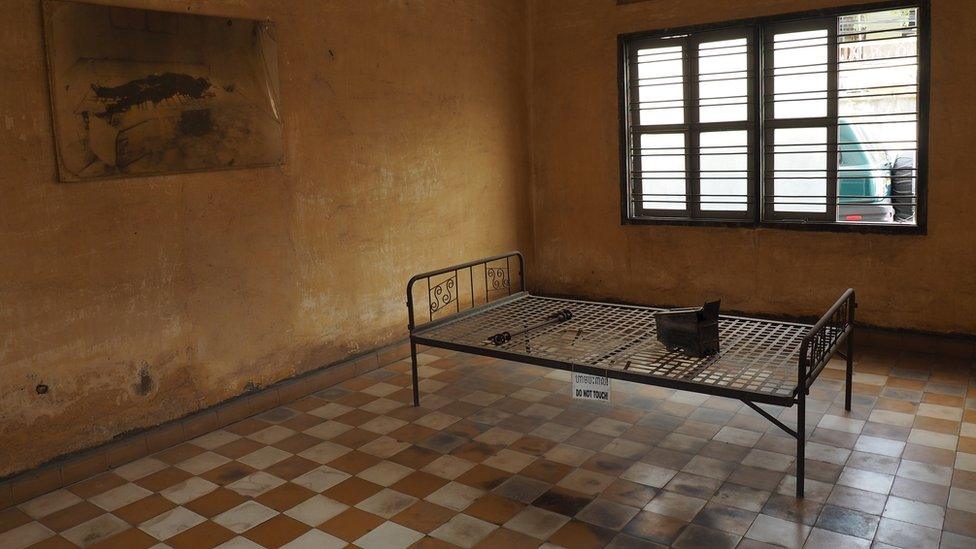
Tuol Sleng was turned from a school to a prison, torture site and death camp
Prisoners were initially officials from the old government, people accused of being middle class and later mainly Khmer Rouge members suspected of disloyalty.
The guards, who were often teenagers, forced the prisoners to write detailed confessions to whatever they were accused of and implicate friends and family who were then imprisoned in turn.
Those who survived the torture where eventually taken to the "killing fields" at Choeung Ek where they were killed, sometimes after digging their own mass graves.
Fewer than a dozen prisoners survived Tuol Sleng.
A survivor of Cambodia's 'Killing Fields'
"Nothing in the former schoolhouse took place without Duch's approval. His control was total," wrote photojournalist Nic Dunlop, who found him in 1999 hiding near the Thai border.
During his trial, Duch admitted he had been in charge of Tuol Sleng and apologised for his part in the horrors committed there.
He later claimed he had only been following orders, but his appeal on those grounds was rejected by the tribunal.
Who were the Khmer Rouge?
The brutal Khmer Rouge, in power from 1975-1979, claimed the lives of around two million people.
The regime led by Pol Pot tried to take Cambodia back to the Middle Ages, or "Year Zero", forcing millions of people from the cities to work on communal farms in the countryside.
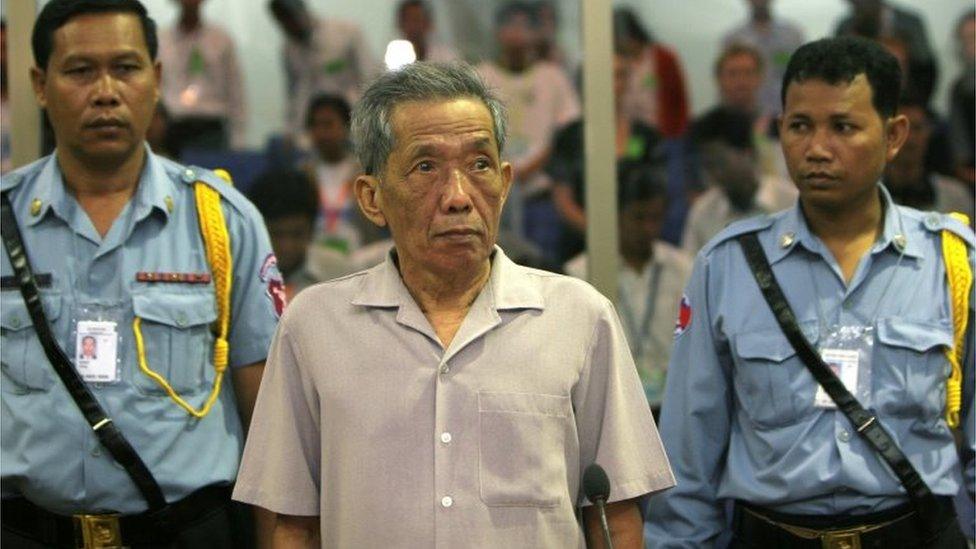
At his trial, Duch apologised to relatives of his victims but asked to be freed
They at first targeted "intellectuals" - often identified as those who wore glasses or spoke a foreign language - and those connected to the old, US-backed regime that they overthrew. But their paranoid leaders later began to see "enemies" everywhere.
Ethnic Vietnamese and Cham Muslims in Cambodia were also targeted. Many of the Khmer Rouge's victims died from starvation, disease and overwork.
The regime was ousted in 1979 by Vietnamese troops, but the Khmer Rouge leaders escaped and continued to resist the new, Vietnamese-backed government from areas along the Thai-Cambodia border.
The UN helped establish a tribunal to try the surviving leaders, which began work in 2009.
Despite hundreds of millions of dollars in international aid spent, only three former Khmer Rouge have ever been sentenced - Comrade Duch, the regime's head of state Khieu Samphan and Pol Pot's second-in-command, Nuon Chea, who died last year after being convicted of genocide. Pol Pot himself died in 1998.
The BBC's Guy de Launey, who attended Duch's trial, said he sat impassively through proceedings, external while judges described the techniques used at Tuol Sleng.
Who was Comrade Duch?
Duch was born in the early 1940s. He was a teacher but joined the communist party and his leftist activism led to brushes with the authorities.
When the Vietnam war threatened to spill into neighbouring Cambodia, Duch joined the Khmer Rouge communist rebels under leader Pol Pot.
After the rebels took control in 1975, he became the director of Tuol Sleng.
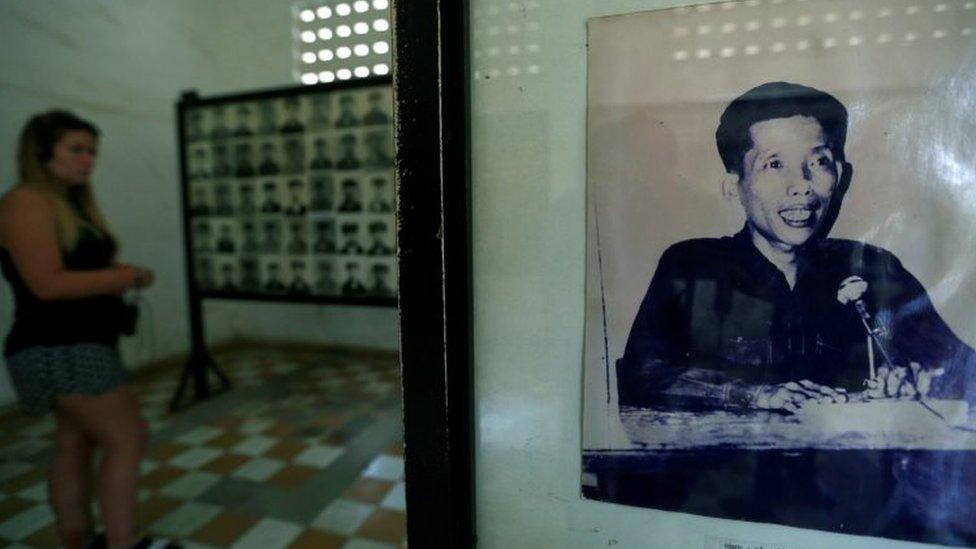
An image of Kaing Guek Eav, also known as Comrade Duch, at the Genocide Museum in Phnom Penh
In 1979, he fled along with other senior Khmer Rouge members into countryside near the Thai border.
Living under a false name, he was identified by Nic Dunlop in 1999. In subsequent interviews, he admitted to the atrocities at Tuol Sleng but said the orders came from the Khmer Rouge's central committee.
"Whoever was arrested must die. It was the rule of our party," he said. "We had the responsibility to interrogate and give the confession to the central committee of the party."
Ten years later, facing the UN-backed tribunal, he described himself as "deeply remorseful" and apologised to relatives of his victims.
In the closing days of his trial, he asked to be freed, saying he had not been a senior member of the Khmer Rouge hierarchy.
Relatives of his victims said this made a mockery of his claims of remorse.
- Published21 February 2020
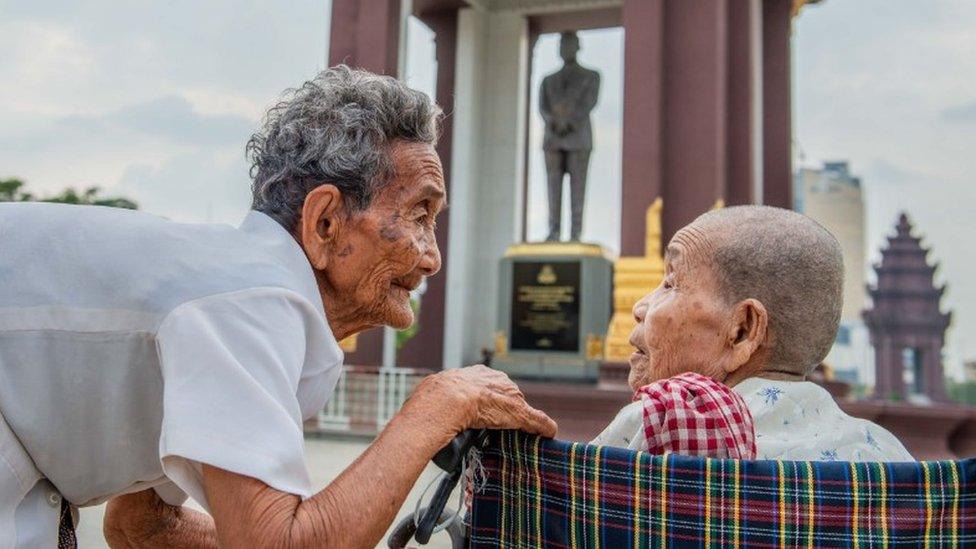
- Published28 July 2018
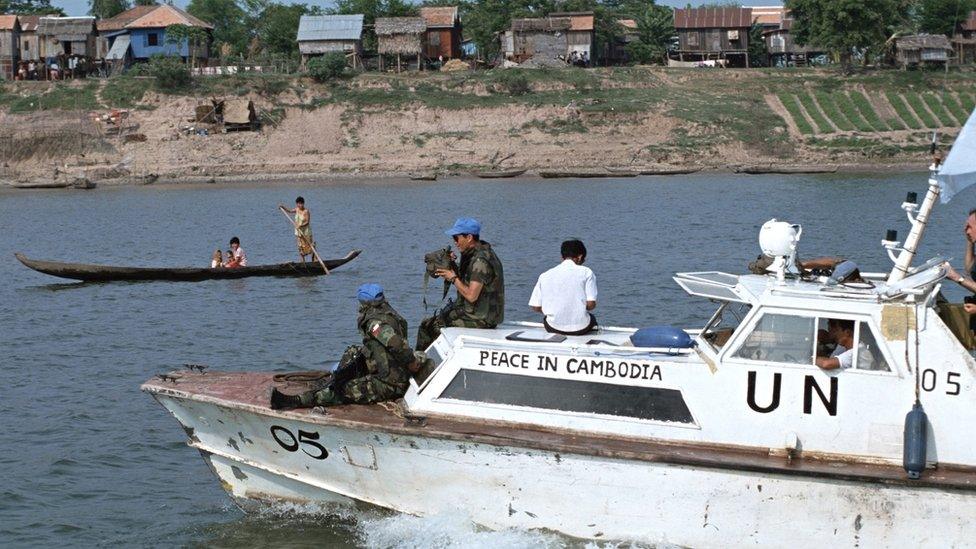
- Published11 June 2015
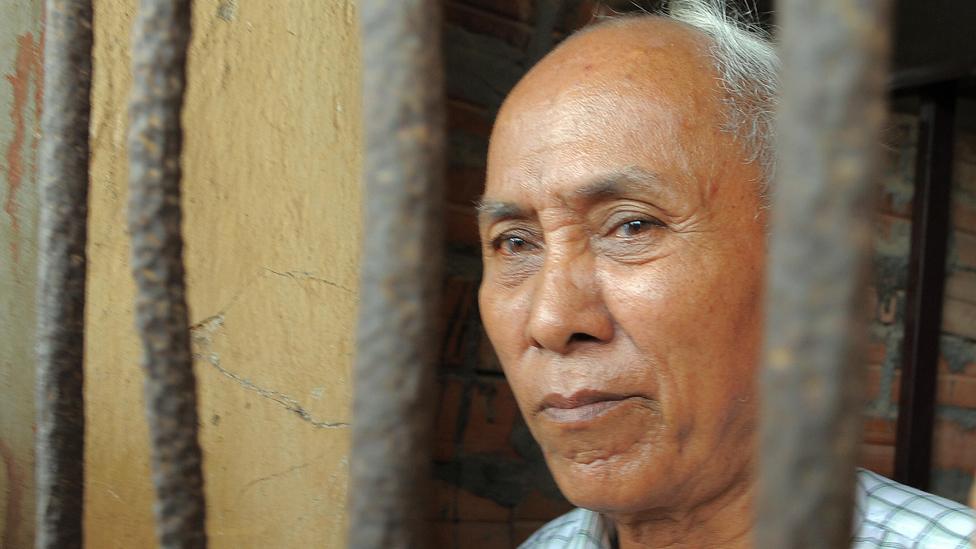
- Published3 July 2019
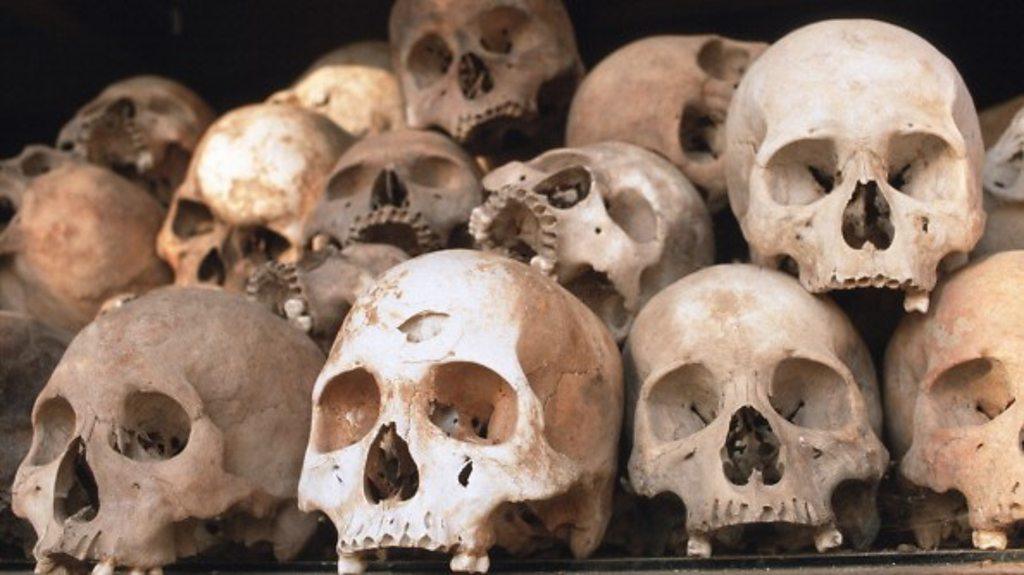
- Published9 June 2016
